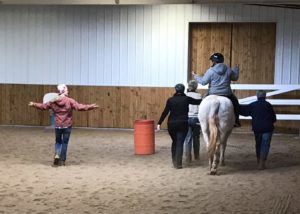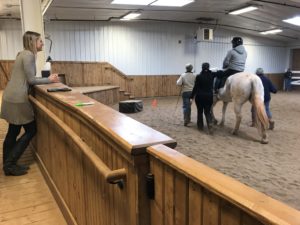A 14-year-old boy with autism is led slowly around an arena by horseback, while an occupational therapist gently gives him simple tasks like lifting his arms or dropping a ring around an orange cone.
The boy’s mother says her son has seen significant behavioral improvements since he started the equine-assisted occupational therapy program 10 weeks ago.
‘He’s so cooperative now’
“He used to yell a lot, but he seems to have calmed down quite a bit,” she says. “He’s so cooperative now. We had a really good week; it was like I was on vacation.”
The mother, who wishes to protect her family’s identity, noticed signs of delay when her son was 2 years old, and he was diagnosed with autism shortly afterward. But since he started the equine-assisted occupational therapy as part of a Colorado State University research project, he has shown advances in communication, and he’s learned to be comfortable around horses.

“He used to be afraid of animals,” she says. “There’s progress, for sure. He looks forward to coming here, and he didn’t even want to come in the door the first day.”
The study on how equine-assisted occupational therapy might provide social and behavioral improvements in kids with autism spectrum disorders is being led by occupational therapist and CSU Ph.D. candidate Caiti McDaniel. McDaniel, who got her OT degree from CSU, is a research assistant for the Temple Grandin Equine Center.
The study, which involved eight children between the ages of 6 and 14, began on Sept. 25 and ran for 10 weeks.
Starting the study
Before introducing the horses, McDaniel met with the children and their parents to establish individual goals. Since the goals are unique to the participant, they are measured in different ways, but all of the parents are heavily involved in tracking their children’s behavior. At the beginning and the end of the 10-week intervention, they fill out a form on social cognition, social motivation and other indicators of social function. Each week they also complete a checklist documenting behaviors like irritability and hyperactivity that their children have exhibited during the week. Finally, using a smartphone app that prompts them daily, parents also track progress on their child’s personalized goals.

Monitoring these various areas before, during and after the study allows McDaniel and her research team to see whether the kids’ social skills and behaviors are improving as they participate in equine-assisted occupational therapy. For example, she says, one participant couldn’t tie his shoes and would have a meltdown every time he tried. Since the therapy started, he is now able to tie his shoes without getting upset.
“It’s easy to see how motivated the children are,” McDaniel says. “When they come, they know their horse, and they’ve got these big smiles. It makes therapy very rewarding and enjoyable.”
Free of charge
The study is free of charge for participants, who come to the Hearts and Horses Therapeutic Riding Center in Loveland once a week to complete a 45-minute therapy session. Each therapy session is slightly different, depending on the goals of the child, but each child rides a horse, participates in a ground activity, and socially interacts with the horses and people around them.
McDaniel and her team, which is led by CSU Professor Wendy Wood, don’t have final results for the study yet, but the researchers have already seen a positive trend in the data and expect to have results in spring 2018.
Hearts and Horses
Established in 1997, the Hearts and Horses Therapeutic Riding Center is certified by the Professional Association of Therapeutic Horsemanship International as a premier accredited center — the highest level of accreditation possible. With over 800 participants, the center relies heavily on a team of volunteers that works to make riders comfortable during their sessions.
McDaniel’s research, which is for her dissertation, is being funded by the Carl and Caroline Swanson Foundation. The Department of Occupational Therapy is in CSU’s College of Health and Human Sciences.
About the Temple Grandin Equine Center
The College of Agricultural Sciences at Colorado State University is currently raising funds to build a Temple Grandin Equine Center on the Fort Collins campus. The facility will house faculty members and graduate students conducting research in the area of equine assisted activity and therapy. Therapy sessions will also be held at the future Fort Collins facility where parents, children, and other patients can have a safe, welcoming, and private space. For more information, contact Keely Mendicino at keely.mendicino@colostate.edu in the college’s Development Office.